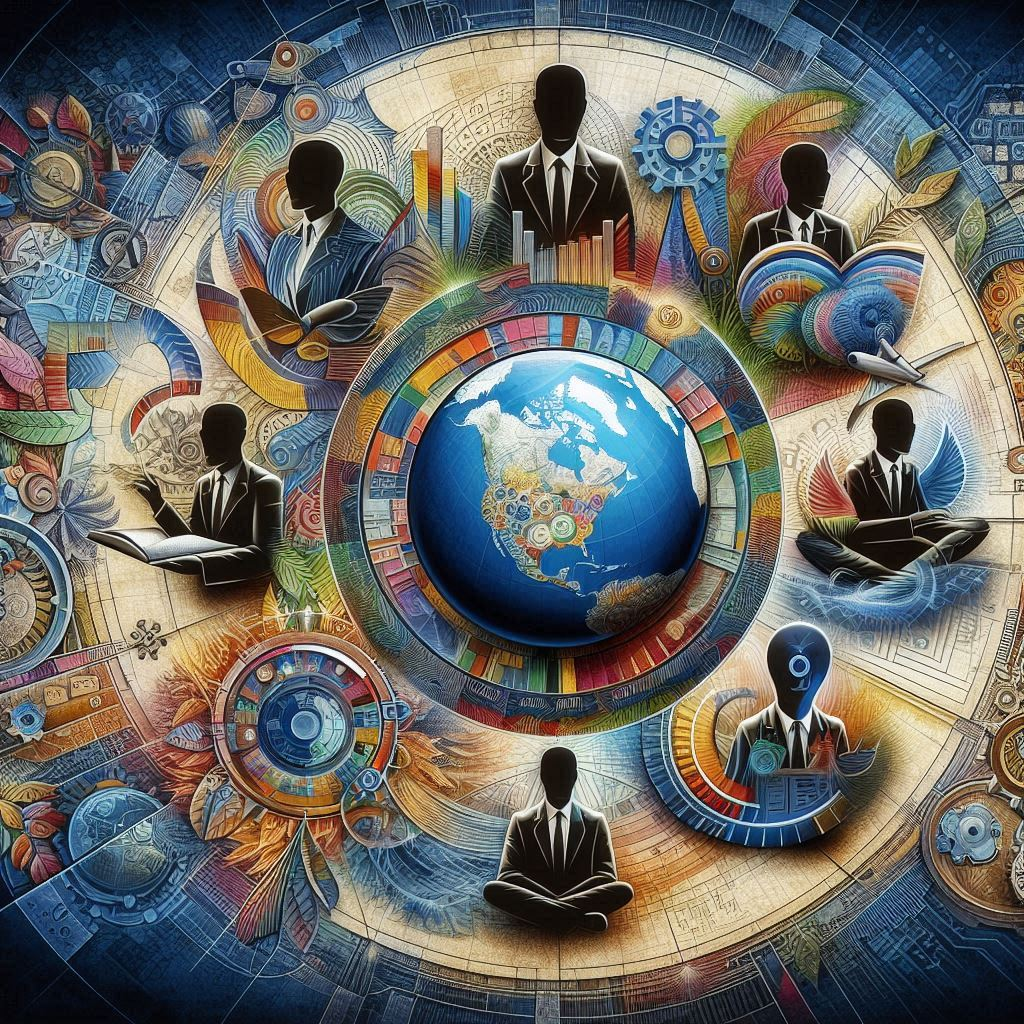Lesallan – October 8, 2024

Mapping the Content Domain for Global Leadership Competencies
Understanding and defining the specific skills and behaviors required for effective leadership in diverse cultural contexts is not just crucial, but it is the cornerstone of global leadership competencies. Bird et al. (2018) emphasized the need for a practical understanding of business and organizational realities in developing global leadership competencies. This understanding empowers leaders to operate efficiently across various cultural settings. By delineating the content domain pertaining to global leadership competencies, leaders can be furnished with the requisite tools to adeptly navigate the complexities of global markets and effectively oversee multicultural teams. This systematic approach not only equips leaders with a profound comprehension of the skills and conduct essential for excelling in diverse cultural and global business milieus, but also instills a sense of confidence and capability in them.
In accordance with Bird’s (2018) insights, developing a competency development plan involves several essential steps. Firstly, it is imperative to define organizational competencies by identifying the core competencies crucial for the organization’s success in a global context. This involves understanding the specific business and cultural challenges the organization faces. Engaging key stakeholders, such as leaders, managers, and employees, in the process ensures the relevance and comprehensiveness of the identified competencies. Drawing upon established competency frameworks as a reference can aid in developing a customized framework for the organization. Crafting detailed competency profiles for each role within the organization ensures alignment of individual development with organizational goals. Conducting competency assessments helps identify current competency levels and gaps. Analyzing the results of these assessments offers insight into the strengths and weaknesses within the organization. Establishing personalized development plans for employees to address competency gaps is crucial, and these plans can involve training programs, mentoring, and other developmental activities. Lastly, continuous monitoring and making necessary adjustments of the development plans provide a sense of reassurance and security, ensuring their effectiveness.
The five core competencies outlined by Hu-Chan (2015) underpin our competency development plan. These competencies are integral to our organization, encompassing upholding high ethical standards and ensuring a secure working environment for all employees. Moreover, they underscore the significance of enabling self-organization, nurturing a sense of connection and belonging among employees, embracing innovative ideas and experimentation, and demonstrating a dedication to the professional and intellectual growth of our team members. This steadfast commitment to employee development reflects leaders’ profound value and gratitude for their team, ultimately fostering a positive and fruitful organizational culture.
In summary, delineating the content domain for global leadership competencies is a strategic undertaking that encompasses defining, evaluating, and fostering the essential skills for successful leadership in a global setting. By incorporating the five fundamental competencies outlined by Hu-Chan (2015), organizations can guarantee that their leaders are adequately prepared to maneuver the intricacies of global business landscapes and propel organizational triumph. These five competencies, which include upholding high ethical standards, ensuring a secure working environment, enabling self-organization, nurturing a sense of connection and belonging, embracing innovative ideas and experimentation, and demonstrating a dedication to the professional and intellectual growth of team members, are crucial for developing effective global leaders.
Blessings,
Lesallan
References:
Bird, A., Mendenhall, M. E., Osland, J., Oddou, G. R., Stevens, M. J., Maznevski, M. L., &
Stahl, G. K. (2018). Global leadership: Research, practice, and development. Routledge Taylor & Francis Group.
Hu-Chan, M. (2015). Five core competencies for global leaders. In YouTube.



9 Comments
temp mail · October 12, 2024 at 7:20 am
This was beautiful Admin. Thank you for your reflections.
temporary email · October 12, 2024 at 8:39 am
Pretty! This has been a really wonderful post. Many thanks for providing these details.
Technoob · October 14, 2024 at 8:36 pm
Technoob Good post! We will be linking to this particularly great post on our site. Keep up the great writing
Ankara Avukat · October 15, 2024 at 1:39 pm
Thank you for this insightful post! I really appreciate the effort you put into creating such valuable content.
Touch to Unlock · October 16, 2024 at 5:05 am
Touch to Unlock Nice post. I learn something totally new and challenging on websites
Healxo · October 19, 2024 at 9:33 am
Your blog is a shining example of excellence in content creation. I’m continually impressed by the depth of your knowledge and the clarity of your writing. Thank you for all that you do.
Samantha Spivey · October 19, 2024 at 11:10 am
Hi,
Are you finding it hard to find time for writing articles?
Bring in an expert SEO writer today!
I handle the research and offer well-written SEO content perfect for higher ranking and enhance your visitor interaction.
Looking for fresh content for your blog or to enhance your content marketing, see our current content deals here:
https://bit.ly/benwriting
Benjamin
Contact me directly at behinger@writingbybenjamin.com or on Skype: behinger19 with any questions.
If you don’t want to get an email from me on this matter again, please reply back with the text: “No, thank you”
메이저놀이터 · October 20, 2024 at 7:01 pm
먹튀검증 완료 안전한 메이저 토토사이트 리스트를 확인하세요. 다양한 이벤트와 혜택도 함께 제공됩니다. https://mtverify.com/
Barry Tew · October 22, 2024 at 3:05 am
Enhancing your website’s performance and monitoring your marketing efforts just got easier! With our UTM Code Generator at SEOGEEK, you can:
Create custom tracking codes effortlessly to gain essential insights into your digital marketing campaigns.
Identify where your traffic comes from to optimize your strategies effectively.
Assess the effectiveness of your campaigns with UTM codes, allowing for smart decisions that enhance your marketing efforts.
If you’re ready to get started, check out our resources:
** Quick tutorial video on using the UTM Code Generator: https://www.youtube.com/watch?v=LkZm0rtMrbM
## Learn more about the importance of UTM codes for your campaigns: https://bit.ly/generateutm
Let us take your digital marketing to the next level!
You can unsubscribe by filling the form with your website URL at https://bit.ly/unsubus
55 Sloe Lane, Croxton, Chandler , AZ, US
Comments are closed.